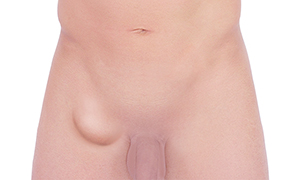
A femoral hernia happens when tissue pushes through a weak spot in your groin or inner thigh. This type of hernia (which is different from inguinal hernia, hiatus hernia, incisional hernia, or umbilical hernia) appears as a lump or bulge and may cause groin discomfort.
Causes of Femoral Hernias
The exact cause of femoral hernias is unknown. Sometimes, people are born with a structurally weak spot in the muscle wall of the groin area. Straining or excess pressure may also help produce this type of hernia. The straining or pressure can be a result of :
- Passing stool or urine
- Obesity
- Lifting or pushing heavy objects
- Persistent, strong cough
- Giving birth
- Presence of ascites (abnormal retention of abdominal fluid)
- Dialysis treatment
Risk Factors for Femoral Hernia
- Being female (women are nearly ten times more likely to develop a femoral hernia)
- Age (adults are more likely to have one than children)
- Family history (genetics may account for an eight fold increase in risk)
Symptoms
The most common symptom is the lump or bulge in the inner thigh or groin area. They can be tender or painful. Typically, these bulges often occur on the right-hand side of the body, though they may also occur on the left, as well as on both sides. The bulge may seem to disappear when lying down, or get bigger when straining. Many femoral hernias are not accompanied by other symptoms. But, in severe cases, nausea, vomiting, or stomach pain.
How to Get a Diagnosis
If you think you have a femoral hernia, see your doctor promptly. The doctor will examine the bulge and gently press on the area, or may order image testing to confirm it is a femoral hernia.
Complications
While femoral hernias are fairly uncommon (they account for only about 5% of groin hernias) they carry a high risk of serious complications. Femoral hernias can become strangulated or lead to a bowel obstruction. A doctor will confirm the diagnosis of femoral hernia and will evaluate whether treatment is needed. Some femoral hernias require no treatment other than monitoring. But, some femoral hernias can lead to life-threatening complications that require immediate medical attention.
Surgical Hernia Repair
If your femoral hernia requires surgical repair, a surgeon like Dr. Shillingford, MD can provide treatment. Based on the size of the hernia, the person’s health status, age, and other factors, surgery may be done laparoscopically or open. A surgical consultation may be necessary before your hernia repair surgery.
If your femoral hernia requires surgical treatment, do not delay in scheduling a surgical consultation with Dr. Shillingford, MD, PA. Dr. Shillingford has performed over 4,000 surgical procedures and specializes in advanced laparoscopic and robotic surgery, in addition to bariatric surgery. Dr. Shillingford’s Boca Raton office is conveniently located for patients in the Miami, Fort Lauderdale, West Palm Beach, Wellington, Coral Springs, and Parkland area. Don’t wait for your hernia to be an emergency, call Dr. Shillingford’s office today at (561) 483-8840.

 Am I A Candidate
Am I A Candidate  BMI Calculator
BMI Calculator  Why Choose Us
Why Choose Us